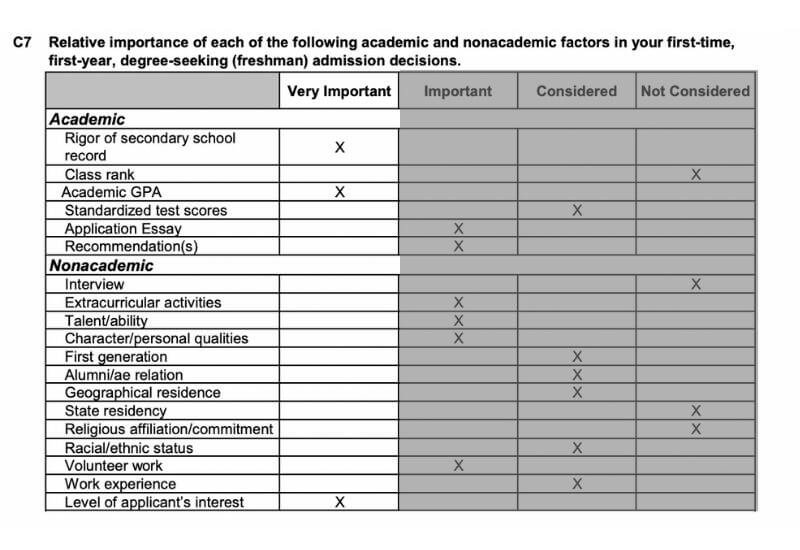Benefits Of Demonstrated Interest
Whenever we meet with students about their college aspirations, we stress to them how important it is today to take charge of their future. And then we give specifics about what exactly a student can control in the admissions process. One such lever of control within the student’s grasp is surely entitled, demonstrated interest.
Honestly, it’s straightforward. Just as you may have behaved in particular ways to demonstrate your interest in becoming friends with a peer, you can also take action to ‘befriend’ a college. If a school knows that you’re honestly interested, they’ll turn a brighter light on you. Plant the seed in the mind of the admission officer that you are really interested—and have been interested for some time! Water that seedling and make it grow. Let’s look at some ways to do that. But, first, let’s talk a little about how to find out if a school uses demonstrated interest, and its level of importance in the application review.
Yes, you can point-blank ask a college’s admissions representative if applicant interest is considered – and you may get an honest answer. However, determining the use and importance of applicant interest can be a matter of research, and the tool is readily available! Many well-known colleges report statistical information annually, and this data includes factors used in admission: GPA, test scores, essays, recommendations, and, yes, applicant interest! Curious where to find this information? Google “College name” + Common Data Set. This search will bring you to the page on the college’s website where you can easily access the most recent CDS in PDF format (currently, colleges publicly sharing their Common Data Sets should have 2019-2020 or 2020-2021 data available; use the most recent year). Open the CDS, and scroll down to section C7. You’ll find applicant interest at the bottom on the chart with an “X” to indicate its level of importance for that school. Check out the importance one private university places on demonstrated interest in the screenshot below from American University's 2020-2021 CDS, giving it equal weighting to GPA and course rigor:
Now that you’ve seen its importance, you’re likely wondering how one goes about cultivating demonstrated interest. First of all, statistics paint a tough picture: the number of students applying to schools—especially the “brand name” (popular, well known) institutions—increases annually. So, the more types of contacts you can create with the schools of choice, the better you’ll be regarded. Most all of the inquiries and other means of linking to the school that you generate during your high school career can make their way into your admissions dossier. Schools possess long memories.
Have you visited your campuses of choice? You’d better do so, because your visit will improve your chances for admission! Walking the paths and sidewalks, visiting the classrooms, residence halls, dining facilities, library, and fitness center gives you and the school a greater sense of how you’ll see yourself as an undergraduate. Did you get the names of your contacts at the admissions information session? You certainly did, and then you wrote a short, sweet thank you note indicating your continued enthusiasm about becoming a part of the school community. Even during pandemic-era limitations on in-person campus visits and other admissions office programming, you can absolutely take advantage of robust virtual events to demonstrate your sincere interest – all from the comfort of your living room couch!
Some parents don’t believe us when we stress the incredible importance of college visits. But don’t just take our word for it. Here’s what Jordanna Suriani, admissions counselor at Ramapo College of New Jersey, stated in a recent New York Times article (read carefully):
“At some well-known, selective, private universities, admissions offices are declining to offer a seat to students who are strong fits academically, only because the student didn’t make enough of an effort to show her interest in the institution. The student is not considered a likely enrollee, and the school prefers to admit the student with less impressive credentials who has attended open house, written to an admissions officer that College X is his first choice, and met with an alum rep at his local college fair.”
I trust that you see our point. Make your travel plans, in-person or virtual, for those schools on your short list.
You’re now a fan on the school’s Facebook and other social media pages, right? Right. You met the school rep at college night in your school’s cafeteria, remember? Yes. Did you call admissions to inquire about any alumni in your area to whom you could speak (many schools have alumni-conducted admissions interviews)? That’s yet another chance to plug into your dream school’s admissions mainframe.
Schools compete for students, too. They want to fill their dorms and campuses to the max with motivated, engaging, responsible students. That’s where your actions fit in: you actually demonstrate these qualities when you pursue the school—I mean, really pursue the school. That doesn’t translate into calling the admissions office every day. That would be a terrible mistake. Rather, show the breadth of your interest when you “touch” the school in myriad ways. Reports from college data collectors about admissions results point to an increased emphasis on, and attention to, an applicant’s demonstrated interest. Motivated by your interest, the school will accept you in the belief that you’ll say “YES!” to its offer, thereby improving the school’s “yield,” or that percentage of admitted students who actually choose to attend. The higher the yield, the greater the school’s bragging rights among its peer schools.
Put yourself in the shoes of admissions at, say, Tulane University in New Orleans, where the admissions office staff makes a first pass at the over 43,000 applications received annually for just over 1,800 freshman spots. You have to stand up and stand out! Demonstrate your interest so that your application will move up the food chain.
Here’s a recap of things to do:
- Get on the school’s email and snail mail list.
- Inquire about arranging an admissions or alumni interview.
- Visit the campus, take the tour, attend the info session. Applications have a box to check off that indicates you have visited! You can even call ahead to stay overnight (lots better than just visiting via the web. Gee.)
- Talk to students, professors, coaches.
- Get names! Get business cards! Send thank-you notes.
- Your visit will have a profound impact on your answer to an application question like: “Why do you want to become a part of the Oberlin College community?”
Note well: even the best of students loaded with tons of advanced courses, and with lots of community service hours, and who can play the clarinet while standing on someone’s shoulders, won’t make the cut if they don’t take the time to demonstrate interest. In a bizarre business twist, a school that rejects or wait-lists such high-powered applicants actually improves its ranking or competitive cachet. Imagine.
Admissions folks are a savvy bunch. We repeat that all the time. They have a pretty good sense about when an applicant is honest and when not. Don’t show false enthusiasm. Put your energy into the schools that are on your short list.
OK, so now the bad news—for a few of you. Some schools are so competitive that students tend to self-select. These brand-name schools don’t worry much about student interest, because if you’re applying to such an institution, you’d better have a strong ticket in your pocket. There are lots and lots of folks standing on line to be admitted, and the school can be extremely picky. Only 3% or so of applicants to Harvard College get the fat envelope. Honestly, your demonstrated interest in an Ivy League or similar school won’t really help your chances of admission; however, the visit will help you clarify why you want to go to each school, enabling you to write a more convincing “Why this College” essay.
Do your best; work hard, and you’ll reap your just rewards. Be demonstrative! If you need help, contact us.
